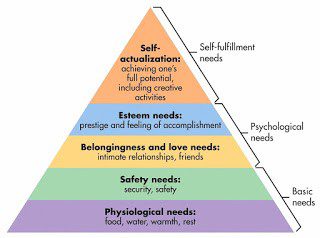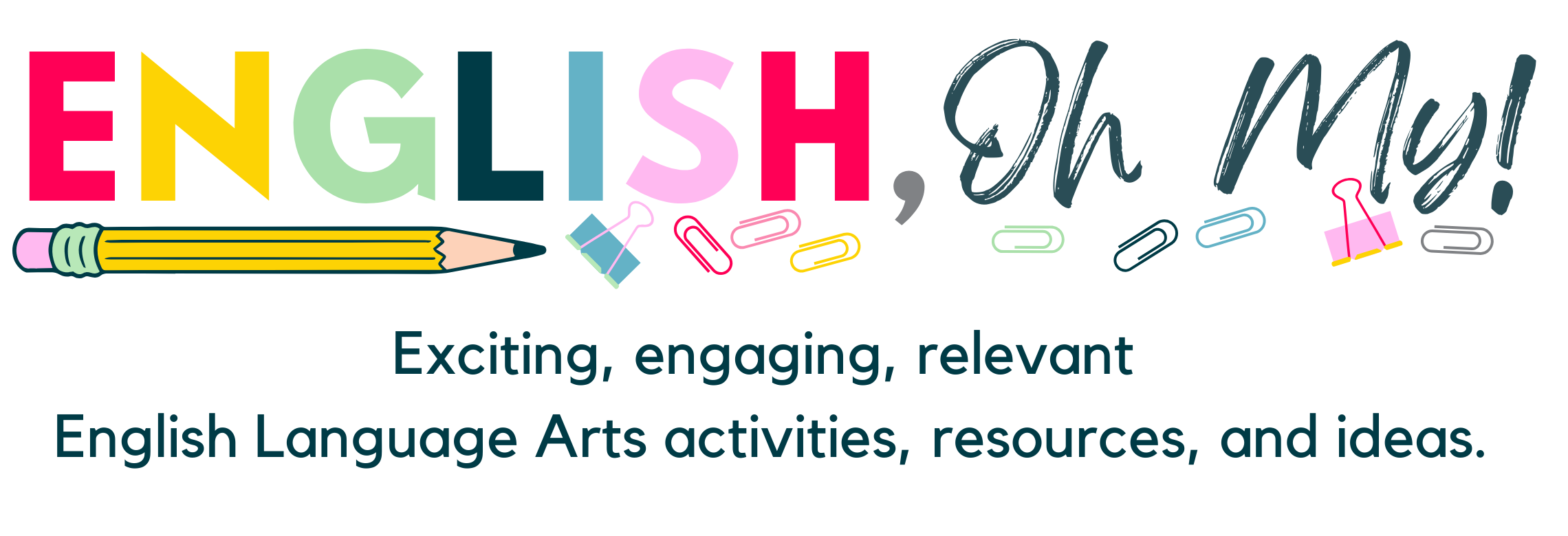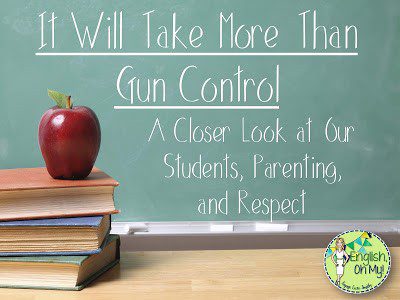This is a very different blog post for me. As many of you know, my blog is filled with teaching tips, ideas and tricks to help other teachers. I often share posts about some of my new products that may assist you in your classroom. Honestly, I had to think long and hard about posting this one, but as a teacher who is on the front lines with students on a daily basis, I knew I had to share this.
Like so many others, last week my heart was torn once again by another school shooting. Marjory Stoneman Douglas High School faced an incomprehensible tragedy no parent, teacher, faculty member or administrator should ever have to bear. Just like all of our schools, everyone has their procedures for their “code red”; we drill, we discuss, and we practice state protocols for a “God forbid” moment. MSDHS did everything they were suppose to do and followed all their protocols; however, as Cynthia Rylant said, “But those with an evil heart seem to have a talent of destroying anything beautiful that is about to bloom.” There was only so much the teachers and faculty could do in these few moments, and they did their best, as all of us would do.
In the following days, the voices of the Majory Stoneman Douglas High School students, parents, teachers, and faculty raised their voices and have called, yelled, and screamed for government action on gun control. I am so proud of these young students for standing up for their school, their peers, their lost friends and the nation. I ask my students all the time to stand up for what they believe in, to speak up, and to advocate for oneself and others. It is refreshing to see this take place; unfortunately, we tend to speak louder in a time of tragedy. This was a teachable moment for me: Speak up NOW, not LATER.
Now here comes the point of the blog post that you may not like-you may disagree with with me or dislike what I am about to say, but as a teacher who has been in the classroom for 18 years, I feel like it is part of my duty to say something and give you the honest truth. I have listened, pondered, and really soul-searched about the debate of gun control these last weeks, and I came to the conclusion: It is going to take much more than gun control to fix these tragedies.
***
Let me start by saying this. This has nothing to do with politics and my own political viewpoints. I have never owned a gun in my life, nor have my family members when I was growing up. I have always felt indifferent about guns-Eh…I could take it or leave it. If people want to bear arms, it is their right. It wasn’t until I met my husband, now an Air Force military veteran, when I learned about guns. He is and has been a gun owner for many years-they were a part of his life growing up in the South and being an active member of the military. This is probably the same for those of you who have a spouse or loved one who is a police officer or in some type of law enforcement. In my house, respect and safety is a priority when it comes to these weapons-locked gun safes, hidden keys and combinations, etc. However, there came a time my husband insisted, regardless of how I felt, that I should know how to operate and shoot a gun for the safety of myself and my family. This was the only time I have ever handled one; I knew how to protect myself and my son if anyone entered my house unwarranted.
At this moment, how do I feel about guns? I do not like them, but I do not loathe them. They have a purpose, and one of these purposes is not to fall into the hands of a young adult. One of the questions I asked myself these last weeks was, “If we think an 18-year-old is too young and irresponsible to buy, pour, or handle alcohol and cannot do this until they are 21, how are they bloody responsible enough to own and operate a gun and bullets at 18?!?!” Does the gun age need to change? Absolutely. Is this going to stop shootings, whether it on the streets, in a grocery store or in a school? I hate to say this, but no. Gun control is just one small proponent of a very large problem.
Hear me out. You are now asking me, well what is the larger problem here? It’s the gun. It’s the person behind the gun. It’s the gun age. It is the mentally ill. No guns. Add more armed guards to schools. Arm teachers. Do not arm anyone. Better background checks. More background checks. Longer background checks. Yes, yes and yes. I agree with you, but this is still one small piece of other major contributing factors. Over the last 18 years of my teaching career, there have been MANY changes-in education, in parenting, in my students, in technology, and in priorities. Here is where I believe the larger problems lie.
1. Basic needs are not being met.
Are you familiar with Maslow’s Hierarchy of Needs? It looks like this:

According to Maslow, one can only obtain the next level of the pyramid, if one has the items before it. For the majority of our students, they have the first level-food, water, warmth and rest. We can even say, most of them have the second level-security and safety (no one, but a school faculty member, can express what it is like to have a student who does not have the basic level of needs. It is heart-breaking).
Here is where things begin to get a bit dicey, and you will begin to understand what I mean about CHANGE. According to a TIME article written in November of 2016, “…In the journal Pediatrics… (they) found that the prevalence of teens who reported a MDE (Major Depressive Episode) in the previous 12 months jumped from 8.7% in 2005 to 11.5% 2014. That’s a 37% increase” (Schrobsdorff, 2016). What is even more eye-opening is 3 million teens from the ages of 12-17 of a variety of ethnic, socioeconomic backgrounds have reported experiencing one major depressive episode, and they are going untreated.
According to an article in The Washington Post, “…all of the possibilities traced back to a major change in teens’ lives: the sudden ascendance of the smart phone” (Twenge, 2017). Our students are more interested in what others have to say about their social media posts, and they base their lives and happiness on how other people feel and see them. Negative posts breed negative feelings. In addition, The Washington Post article also stated, “…teens spend much less time interacting with their friends in person. Interacting with a person face-to-face is one of the deepest wellsprings of human happiness”. If you take a look at the middle level of Maslow’s pyramid, many of these students are lacking belongingness and love needs; therefore, if they are missing this level, they cannot meet their esteem and self-actualization needs. All in all, our students are missing MAJOR psychological and self-fulfillment needs. No. I am not blaming cell phones as the primary cause of this problem, but I believe that many of us can agree the influence of technology has had an immense impact on our students-social media, video games, cell phones, computer software, media, etc.
2. It does come down to respect and manners.
I teach middle school students EVERY DAY. I know them, I love them, and I consider my students my family. Every classroom teacher experiences this. We know our students so well; sometimes too well. Here is something I also know- there is the lack of respect, empathy and compassion with many (not all) of my students toward their parents and their peers. I am not a psychologist or the perfect parent, but I can tell you the most significant characteristic traits are dwindling. Just like Maslow’s Hierarchy of Needs, there should be a hierarchy of emotions and attitude that looks something like this-if someone has the ability to be respectful, they have the ability to be kind. Their kindness give them the ability to show compassion and feel for others. They are then able to have empathetic concern.
Often, schools push kindness-Be kind. Be kind to each other. Help others. Pick up another’s book, if they drop them. However, if students do not have the basic understandings and fundamentals of respect, they cannot reach kindness, nor compassion or empathy. How can they be kind if they do not understand the basic components of respect or show them?
Some students’ attitudes and the way they speak to their parents is absolutely deplorable. I don’t know about you, but if I EVER spoke to my parents in a disrespectful manner, I knew I would be planning my own two-week grounding. Punishment was inevitable. Forget speaking to another adult or a teacher with disrespect; this was a whole different level of punishment.
Part of my household morals, values and roots was respect and responsibility. It was instilled, and my parents expected respect, period. There was no arguing, whining and crying about it. My parents did not come to my rescue with every single issue, and it was part of my responsibility to work it out. If I got myself in a mess, I was responsible for getting myself out of it. My parents were never my friend, just parents-they guided, loved and disciplined me. I earned every ounce of trust with them. Somewhere along my teaching journey, I have watched this slowly evolve and disintegrate. How can we ask students to be respectful of one another and to their teachers, when they cannot be respectful to their own parents? How can we get our students to the levels of kindness and empathy, when they do not have the basic foundations of respect at home or in the classroom?
I’m sorry parents, but something has changed with parenting. Over the last ten years, manners have changed. Kids are pretentious, entitled, and there is a lack of responsibility and respect. I don’t know if it is because someone thought it was a good idea to give everyone a trophy, but many parents and students EXPECT everything-grades, daily babysitting, and for teachers to work miracles with their children but do nothing at home. Everyone wins, and there is this mentality of “my child does no wrong” and “it’s your fault, not my child’s”. When did this change? How can we hold students responsible when parents are not willing to do so? How do we expect a young adult to respect gun laws, if we cannot even get them to respect their family, teachers and peers?
3. What empathy?!?!-The generation of desensitization
Every year, I teach my 8th graders a whole empathy unit, as my curriculum is centered around
To Kill a Mockingbird and
The Diary of Anne Frank. Having 14-year-olds understand these time periods is not easy, especially the events that took place during World War II. I show my students a timeline of WWII, Hitler, and the Holocaust, revealing some rather graphic and disturbing images of concentration camps.
Brace yourself for this-for many of my students, these images do not even phase them-they do not cringe, wince or look away, but rather will say, “Wow. That’s cool!”. Students find other peoples’ pain intriguing, but how can we blame them when their lives are not being censored? They watch YouTube videos and play graphic video games where it is normal to shoot other people. Parents do not censor their children from watching certain inappropriate videos or shows. Their idols are known for becoming famous because of the inane stunts they do.
Many of my 7th and 8th graders watched the entire series of Thirteen Reasons Why, which ended with a very REAL, graphic suicide. When I asked my students if they were taken aback by the last episode, many just shrugged their shoulders. I also asked them if their parents allowed them to watch the series (I already knew the answer to this), and most blatantly admitted their parents had no clue they even watched it. I really could not believe it. If you saw the ending episode, even adults found it disturbing. Here’s the truth: There is no sense of reality, and this is the new norm. Our students are so desensitized, they have such a difficult time feeling for others who are troubled, in pain, or are suffering.
So, what do we do? How do we fix this? Yes, gun control policies need to change, and so does the avenues of people who are receiving mental health care-the health care professionals, providers and receivers; however, the gun control debate is not the full solution; it is just the beginning. As Plato said, “Good people do not need laws to tell them to act responsibly, while bad people will find a way around it.” We have to take a closer look at our children, and how they are being raised. This is key. It is a very simple formula for CHANGE- More respect + more needs + household censorship + a change in parenting + more kindness + respectable gun law changes = REAL CHANGE.








